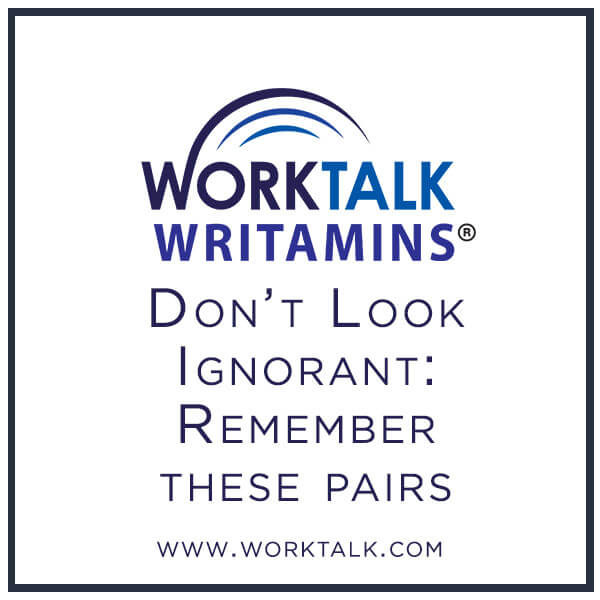
Yes, I know Miss Grindle told you these things in the fifth grade, but hey, a lot has happened since then. In the rush of writing under pressure, we sometimes forget terms that we (hopefully) used to know.
At Worktalk, we relieve the fear of looking dumb by teaching you the right way to write. Here are a few word pairs that often plague people.
because/since
Use because when referring to cause and effect. Use since when referring to a change that occurs over time. Since is acceptable in a causal sense when the first event in a sequence led logically to the second but was not its direct cause.
The project was delayed because the funding approval was delayed.
He went because he was told.
Since its inception, the project has consistently run on schedule.
They went to the game since they had been given the tickets.
e.g./i.e.
e.g. is an abbreviation for the Latin term exemplum gratis, which means, “to give an example”, (not that is). Thus, e.g. means for example. Use it lowercased, with periods after the e and the g. Put commas after this abbreviation. A comma ordinarily also precedes e.g. unless a superior punctuation mark, such as an open bracket, takes precedence.
Bring something useful with you, e.g., a hammer.
Avoid using this abbreviation in text. Splurge: Write for example.
i.e. is an abbreviation for the Latin term id est, which means that is (not for example). Put commas after this abbreviation.
She decided to order dessert, i.e., chocolate cake.
Avoid using this abbreviation. If the abbreviation is needed in a dense document, use lowercase normal font with periods, followed by a comma. A comma ordinarily goes before i.e. unless a superior punctuation mark, such as an open bracket, takes precedence.
then/than
then is generally used as an adverb used to refer to situations in time. As a noun, it refers to a particular time. It also introduces the conclusion in if … then constructions.
First, he opened his window; then I saw him.
I wanted to talk to him this morning but then was not a good time.
If you want to succeed, then you have to work hard.
than is a conjunction used to make comparisons.
He does things differently than you do.
your/you’re
your (pronoun) means belonging to you.
you’re (contraction) is a contraction of you and are.
So you’re the one who forgot your laptop.
These word pairs are not the most difficult ones in our vocabulary. Far from it. But because they are so common, we tend to let them slide. Your welcome or you’re welcome… my reader will know what I mean, won’t she? Yes, she will, but if she cares about language she will also draw unfriendly conclusions about your capabilities. The devil is in the details when it comes to writing. I know that when your fingers are dancing across the keyboard, these errors creep in: I sometimes trip up to … or was it too?

©2018 Elizabeth Danziger All rights reserved
SPECIAL BONUS: List of Commonly Misused Words. The pairs in this Writamin are just the beginning. Find out about affect/effect, imply/infer, and many others. Just write to lizd@worktalk.com and say Yes and we will send you the bonus.
BOOK YOUR FREE CONSULTATION NOW Communication woes drag down productivity and morale. Book your free 30-minute “communications audit” consultation with Elizabeth Danziger. She will listen to your situation and suggest ways to improve communication in your organization right away. Contact her at lizd@worktalk.com or 310.396.8303.
